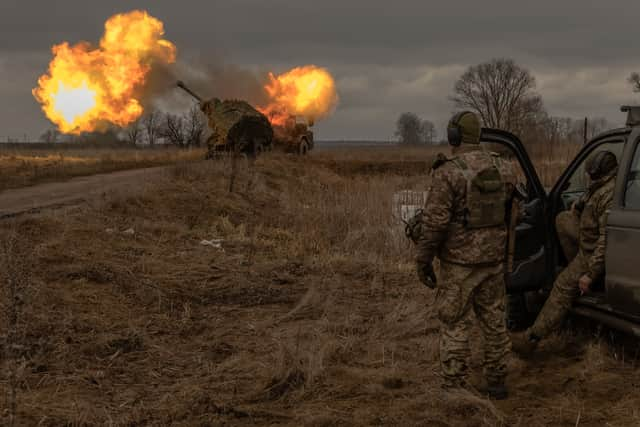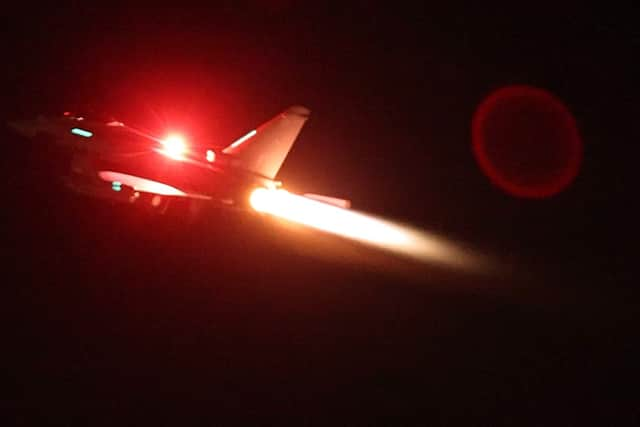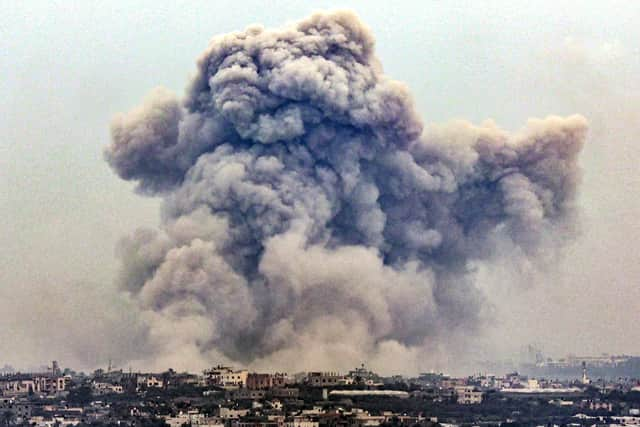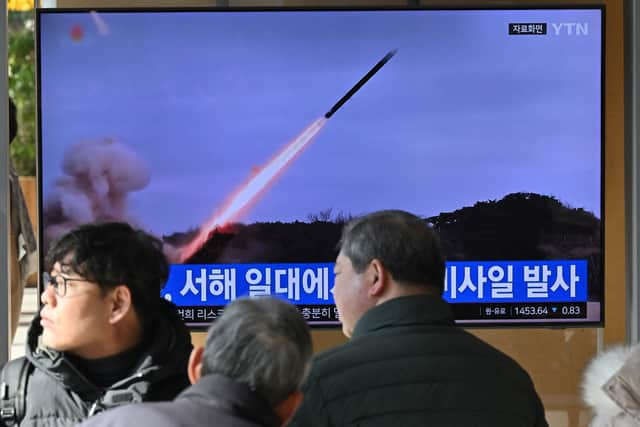Are we on the brink of World War 3? Will there be WW3, is it coming, chances - how likely is it in 2024?
This article contains affiliate links. We may earn a small commission on items purchased through this article, but that does not affect our editorial judgement.
and live on Freeview channel 276
The idea of a World War III has been an anxiety-making notion ever since the closing chapters of the Second World War.
It's a concept that's been more and less prevalent at times, and one that responds to geopolitical tensions as they ebb and flow in intensity.
Advertisement
Hide AdAdvertisement
Hide AdThe Cuban missile crisis and the Cold War are two recent eras in which fears of WW3 were heightened, and arguably, the world finds itself in a perilous position once again with flashes of conflict spouting up across the world.
Earlier this month, the Doomsday Clock - a symbolic representation of the world's proximity to global catastrophe, particularly nuclear war - held steady at "90 seconds to midnight", and when NATO's Admiral Rob Bauer warned "not everything is going to be hunky dory in the next 20 years," alarm bells rang.
Then there was the head of the British Army, who last week warned the public that they may be summoned to serve in defence of King and country should a conflict with Russia arise...
But just how likely is a third global conflict? Who are the aggressors most likely to trigger such a war, and ultimately, would anybody win? Here is everything you need to know.
Advertisement
Hide AdAdvertisement
Hide AdTensions between any country and Russia - one of the world’s most powerful nuclear nations - are sure to cause unease among the wider international community, and World War III has been on the lips of many following Russia's full scale invasion of Ukraine in February 2022.
The global superpower has access to the world's biggest nuclear arsenal, and has repeatedly claimed it would not be afraid to make use of it were the West to interfere in its military plans.


Nearly two years on from Russia's first movements into Ukraine, the protracted and drawn out war appears to have no real end in sight. As to whether Putin's nuclear threats have any real credence - they've previously been described as everything from a "distraction" to "sabre rattling" - remains to be seen.
Currently, the conflict is contained within Ukraine and Russia's far western flanks, but Ukraine is bordered by Nato members Poland, Romania, Slovakia, and Hungary.
Advertisement
Hide AdAdvertisement
Hide AdWere Russia to directly attack any of these countries - even inadvertently - that could be cause for the Nato alliance to band together and defend itself from the threat, which could lead to a global conflict.
The current situation with Iran is complex, and the UK and US' issues with it rest more on militant groups backed by the nation. However, a recent satellite launch furthered concerns in the west over the country's ballistic missile capabilities.
On 29 January, Rishi Sunak urged Iran to de-escalate tensions in the Middle East after three US troops were killed in a drone strike on a US base in Jordan. The Prime Minister expressed his concern about the attack near the Syrian border, which has raised fears about an escalating military conflict in the region.
Joe Biden has blamed Iran-backed militias for what were the first US fatalities after months of strikes against US forces since the start of the Israel-Hamas war.
Advertisement
Hide AdAdvertisement
Hide AdThe president has vowed that the US “shall respond” as Iran-back fighters in eastern Syria reportedly began evacuating their posts fearing air strikes, saying in a statement that the US “will hold all those responsible to account at a time and in a manner (of) our choosing”.
At least 34 US troops were also said to have been injured in the strike on the support base known as Tower 22 on Sunday 28 January.
The Prime Minister’s official spokesperson declined to comment on whether it would back any US reprisals, but said: “We will stand with our US allies in our continued and shared fight against terrorism.”


The US in recent months has also hit targets in Yemen in response to attacks on its forces and to diminish the threats from Iranian-backed Houthi rebels to commercial shipping in the Red Sea.
Advertisement
Hide AdAdvertisement
Hide AdBritain has joined two strikes against the militants in Yemen, though they so far seem to have done little to deter Houthi action.
A British-linked oil tanker went up in flames after a strike claimed by the Yemen-based group on Friday 26 January before a further attack on HMS Diamond, the British destroyer stationed in the Red Sea, was successfully repelled.
The Ministry of Defence branded ongoing action by the Houthis as “intolerable and illegal” and said Britain and its allies “reserve the right to respond appropriately”.
It's no coincidence that the UK has announced it is to send 20,000 troops to take part in Operation Steadfast Defender, a NATO drill which will see a total of 40,000 troops from member states take part in one of the largest European military exercises since the Cold War.
Advertisement
Hide AdAdvertisement
Hide AdWhile some fear the drill is in preparation for a potential conflict with Russia or Iran, others say such a measure is to be expected from a newly-expanded NATO (Finland joined last year) amid a time of emerging - and changing - threats.
Israel
Since 7 October 2023, an armed conflict between Israel and Hamas-led Palestinian militant groups has been taking place chiefly in and around the Gaza Strip.
Palestinian militant groups launched a surprise attack on southern Israel from the Gaza Strip, starting one of the most significant military escalations in the region.
In retaliation, after clearing Hamas militants from its territory, the Israeli military embarked on an extensive aerial bombardment of the Gaza Strip followed by a large-scale ground invasion on 27 October.
Advertisement
Hide AdAdvertisement
Hide AdEver a complex situation, the hostilities constitute the fifth war of the Gaza–Israel conflict, which is part of the broader Israeli–Palestinian conflict.


Almost four months on from the start of the latest wave of the conflict, it continues to grip the attention of the world.
Israel does have nuclear weapons. Though - and it's only a small consolation - it is thought to have one of the smallest reserves of warheads in the world.
The war is another that shows no sign of slowing down anytime soon, and the volatile situation is still spawning protests and counter-protests from those on both sides. The UK's current stance is that it "continues to support Israel’s right to defend itself against Hamas terrorism".
Advertisement
Hide AdAdvertisement
Hide AdNorth Korea continues to be the unpredictable thorn in the world's side. For all intents and purposes, it's a reclusive, rogue state that refuses to play by the rules.
Leader Kim Jong Un has been overseeing missle tests for years, each one reigniting fears that the incalculable nation could one day attack Japan, South Korea - or the US.
Until recently, those missile tests weren't taken too seriously by top military brass, with the belief being that North Korea lacked the technical prowess and resources needed to craft weapons capable of actually hitting its targets.


But in recent years, North Korea has tested a variety of missiles designed to be fired from submarines as it pursues the ability to conduct nuclear strikes from underwater.
Advertisement
Hide AdAdvertisement
Hide AdMissile-firing submarines would add a maritime threat to the North’s growing collection of solid-fuel weapons fired from land vehicles that are designed to overwhelm missile defences of South Korea, Japan and the United States.
Most recently, it was reported by North Korean state media on 29 January that Kim had supervised test firings of such cruise missiles, and reviewed efforts to build a nuclear-powered submarine, state media said on Monday.
Kim reiterated his goal of building a nuclear-armed navy to counter what he portrays as growing external threats.
The situation between China and Taiwan has been under renewed scrutiny since Russia's invasion of Ukraine. The self-governing island of Taiwan is a territory which China believes should be fully reintegrated into the People’s Republic. Sound familiar? It has strong echoes of the Crimea Problem.
Advertisement
Hide AdAdvertisement
Hide AdIf one country can invade under the guise of a territorial dispute, why shouldn't another - and one closely allied with Russia at that - be able to? China is believed to have around 350 nuclear warheads - more than the UK.
In recent years, China has shown displeasure at political activities in Taiwan by sending military planes and ships, and most recently, the Chinese People’s Liberation Army sent 33 aircraft, including SU-30 fighters and six navy vessels around Taiwan between Friday 26 and Saturday 27 January.
Of these, 13 warplanes crossed the midline of the Taiwan Strait – an unofficial boundary that is considered a buffer between the island and mainland. Taiwan monitored the situation and employed its own forces in response to the activities.
US President Joe Biden and Chinese President Xi Jinping met on the sidelines of a summit in November in an effort to patch up frayed relations due to quarrels over a range of economic and geopolitical issues.
Would there be a winner?
Advertisement
Hide AdAdvertisement
Hide Ad"I know not with what weapons World War III will be fought, but World War IV will be fought with sticks and stones."
That's a quote often attributed to Albert Einstein (though there is some uncertainty about its exact origin) which reflects concerns about the destructive potential of a thermo-nuclear war and the devastating consequences it could have for humanity.
The quote suggests that if a third world war were to occur, the technology and weapons used could be so devastating that they might bring about the collapse of civilization as we know it.
It implies a return to primitive and basic weaponry in the future, suggesting that the devastating effects of a third world war could lead to a collapse of technological infrastructure, leaving survivors to resort to primitive means for survival.
Advertisement
Hide AdAdvertisement
Hide AdThe sheer destructiveness of the weapons used in World War III might force humanity to abandon advanced technology altogether, reverting to a more rudimentary existence.
Of course, it's hard to predict exactly what would happen were WW3 ever to break out, but it's worth bearing this quote in mind.
Technology and weaponry have advanced exponentially since the last global conflicts, with humanity dreaming up some truly horrific means of destruction.
Comment Guidelines
National World encourages reader discussion on our stories. User feedback, insights and back-and-forth exchanges add a rich layer of context to reporting. Please review our Community Guidelines before commenting.
